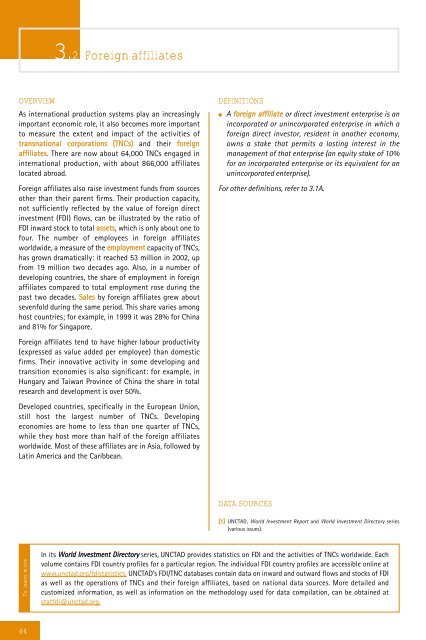Development and Globalization: - Unctad
Development and Globalization: - Unctad
Development and Globalization: - Unctad
You also want an ePaper? Increase the reach of your titles
YUMPU automatically turns print PDFs into web optimized ePapers that Google loves.
OVERVIEW DEFINITIONS<br />
As international production systems play an increasingly<br />
important economic role, it also becomes more important<br />
to measure the extent <strong>and</strong> impact of the activities of<br />
transnational corporations (TNCs) <strong>and</strong> their foreign<br />
affiliates. There are now about 64,000 TNCs engaged in<br />
international production, with about 866,000 affiliates<br />
located abroad.<br />
Foreign affiliates also raise investment funds from sources<br />
other than their parent firms. Their production capacity,<br />
not sufficiently reflected by the value of foreign direct<br />
investment (FDI) flows, can be illustrated by the ratio of<br />
FDI inward stock to total assets, which is only about one to<br />
four. The number of employees in foreign affiliates<br />
worldwide, a measure of the employment capacity of TNCs,<br />
has grown dramatically: it reached 53 million in 2002, up<br />
from 19 million two decades ago. Also, in a number of<br />
developing countries, the share of employment in foreign<br />
affiliates compared to total employment rose during the<br />
past two decades. Sales by foreign affiliates grew about<br />
sevenfold during the same period. This share varies among<br />
host countries; for example, in 1999 it was 28% for China<br />
<strong>and</strong> 81% for Singapore.<br />
Foreign affiliates tend to have higher labour productivity<br />
(expressed as value added per employee) than domestic<br />
firms. Their innovative activity in some developing <strong>and</strong><br />
transition economies is also significant: for example, in<br />
Hungary <strong>and</strong> Taiwan Province of China the share in total<br />
research <strong>and</strong> development is over 50%.<br />
Developed countries, specifically in the European Union,<br />
still host the largest number of TNCs. Developing<br />
economies are home to less than one quarter of TNCs,<br />
while they host more than half of the foreign affiliates<br />
worldwide. Most of these affiliates are in Asia, followed by<br />
Latin America <strong>and</strong> the Caribbean.<br />
To learn more<br />
44<br />
3.2 Foreign affiliates<br />
● A ffoorreeiiggnn aaffffiilliiaattee or direct investment enterprise is an<br />
incorporated or unincorporated enterprise in which a<br />
foreign direct investor, resident in another economy,<br />
owns a stake that permits a lasting interest in the<br />
management of that enterprise (an equity stake of 10%<br />
for an incorporated enterprise or its equivalent for an<br />
unincorporated enterprise).<br />
For other definitions, refer to 3.1A.<br />
DATA SOURCES<br />
[1] UNCTAD, World Investment Report <strong>and</strong> World Investment Directory series<br />
(various issues).<br />
In its WWoorrlldd IInnvveessttmmeenntt DDiirreeccttoorryy series, UNCTAD provides statistics on FDI <strong>and</strong> the activities of TNCs worldwide. Each<br />
volume contains FDI country profiles for a particular region. The individual FDI country profiles are accessible online at<br />
www.unctad.org/fdistatistics. UNCTAD’s FDI/TNC databases contain data on inward <strong>and</strong> outward flows <strong>and</strong> stocks of FDI<br />
as well as the operations of TNCs <strong>and</strong> their foreign affiliates, based on national data sources. More detailed <strong>and</strong><br />
customized information, as well as information on the methodology used for data compilation, can be obtained at<br />
statfdi@unctad.org.

















